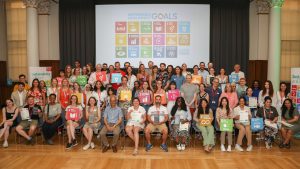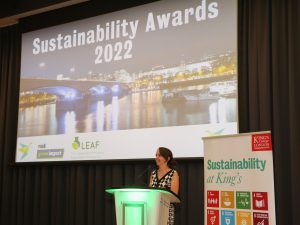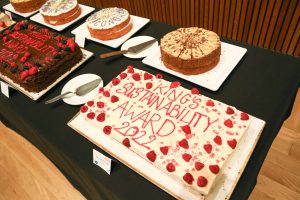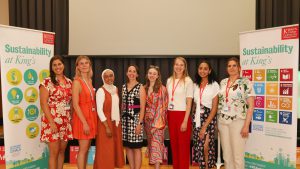This blog post has been adapted from a post written last year by Helena Fazeli for Mental Health Awareness Week. Trigger warning – this blog discusses mental health and suicide.
Mental Health Awareness Week (9-15 May 2022) is the UK’s national week to raise awareness of mental health and mental health problems. The theme this year is loneliness and the week aims to raise awareness of the impact of loneliness on our mental health and the practical steps we can take to address it.
How do mental health and sustainability intersect?
#1 SDG 3 – Ensure healthy lives and promote well-being for all
One of Sustainable Development Goal Three’s (SDG 3) targets is to “reduce by one-third premature mortality from non-communicable diseases through prevention and treatment and promote mental health and well-being”. Awareness of the importance of addressing mental health has increased in recent years, and rightly so: depression represents one of the leading causes of disability, suicide is the second leading cause of death amongst 15-29-year-olds, and people with severe mental health conditions are at risk of premature death due to preventable physical conditions (WHO, 2021). Additionally, individuals with mental health conditions may face stigma, discrimination and human rights violations.
While SDG 3 focuses explicitly on mental health, achieving this target requires progress across all 17 SDGs. Mental health and wellbeing are intricately linked to challenges such as poverty, inequality, work, education, gender, infrastructure, air pollution, access to quality green spaces, peace etc. Not only do these factors increase the risk of poor mental health, but they also impact the accessibility and quality of mental health services.
One example is emergency contexts, including natural disasters, conflict and forced migration, during which many individuals will face temporary distress. In the longer term, the prevalence of common mental disorders generally doubles in a humanitarian crisis due to increased poverty, lack of security, separation from family, community and home, and trauma. Overall, it has been estimated that 1 in 5 people living in an area affected by conflict will have a common mental health condition. Finally, it is important to note that climate change is expected to exacerbate many of these issues, thus causing greater and wider distress, which leads us to our next topic…
#2 Climate change and mental health
When you think about climate change, mental health might not be the first thing that comes to mind. We often discuss climate change on a global scale, in terms of physical processes and tangible, measurable impacts. However, it both directly and indirectly impacts individuals’ and communities’ mental health and psychological well-being.
Indeed, climate change and its associated impacts (rising sea levels, changing temperatures, extreme weather patterns, wildfires, droughts, food and water insecurity, etc.) put at risk a range of phenomena that people and communities value and rely on in their daily lives, both material and non-material, from homes, landscapes and ecosystems to cultural traditions, livelihoods, identities and social cohesion… From forced displacement to gradual changes in an environment, feelings of loss – loss of place, loss of identity, decreased sense of self – can arise. And, as mentioned above, these impacts are more acutely felt in communities and populations where climate change intersects with pre-existing health conditions, socioeconomic inequities and unequal power dynamics.
#3 The rise of eco-anxiety
As with many crises, the climate crisis is causing (justifiably) strong emotional responses, in people and communities around the world. Amongst inspiration and hope for change, feelings of anger, hopelessness, guilt and fear are common and natural.
Eco-anxiety refers to the stress caused by “watching the slow and seemingly irrevocable impacts of climate change unfold” or the “feelings of helplessness, anger, […] panic and guilt toward the climate and ecological crisis”. Force of Nature has been studying the occurrence of eco-anxiety amongst youth globally. They found that amongst 500 respondents, over 70% had experienced feelings of hopelessness in the face of climate change.
In recognition of the interconnectedness between the health of our minds, bodies and planet, last year’s Mental Health Awareness Week’s theme was indeed nature. This demonstrates how sustainability refers not only to environmental sustainability but also to social sustainability.
When you’re feeling overwhelmed by the immensity of the climate crisis, be kind to yourself, and connect with your loved ones and your community. However, if symptoms of anxiety are interfering with your ability to function well and feel good, we encourage you to seek professional help. Here are some ways you can find support at King’s: KCLSU’s wellbeing events, Positive Peers, Counselling and Mental Health support, Black Students Talk, Out-of-hours counselling. You can also find resources here and here.
Get involved this Mental Health Awareness Week
Join the Mental Health & Climate Change seminar (13 May)
What are the links between mental health and climate change? What is eco-anxiety? And how can we go about overcoming this?
To mark the UK mental health awareness week, King’s Sustainability will be joined by neuroscientist Dr Kris De Meyer for a lean-forward seminar on mental health & climate change. According to Kris, the best way to combat eco-anxiety is opening up pathways to action, to give the sense that we are not powerless and that we can indeed do something that is meaningful and can make a difference.
Kris will briefly explain the brain basis of eco-anxiety before diving into interesting break-out room activities exploring how to cope with it. Join this interactive seminar led by an expert on eco-anxiety to build your own eco-anxiety “toolkit” by identifying what your personal pathway to action might be in a safe, positive environment.
Kris is a Visiting Research Fellow at King’s Department of Neuroimaging and the Director of the UCL Climate Action Unit.
This seminar is part of a series that runs monthly between October ‘21 and June ’22 covering some of the biggest topics in sustainability. If you would like to stay in the loop about upcoming seminars, please sign up here. These seminars are linked to the KEATS Sustainability module which we are piloting this year. You can enrol on the module here.
KCLSU’s Take Time Out (3-20 May)
Take Time Out is taking place until the 20th of May and aims to encourage you to schedule in some time, away from your studies, to boost your wellbeing, take a break and connect with the King’s community. See all events here.
More opportunities at King’s
This coming week, King’s wants to focus on what we can do individually and as a community to foster connections and support each other. Access King’s gyms and BeActive programme for free and join the events on journaling, connecting with charities, a virtual coffee morning, or one of the mindfulness sessions. Find out more here.
Some further reading on the topic
Tackling social inequalities to reduce mental health problems: How everyone can flourish equally
Mental Health and our Changing Climate: Impacts, Implications, and Guidance
The case for systems thinking about climate change and mental health
Caring for the environment helps to care for your mental health
Mental health and the environment
Mental health and wellbeing in the Sustainable Development Goals
The Lancet Commission on global mental health and sustainable development
This Must Be the Place: Underrepresentation of Identity and Meaning in Climate Change DecisionMaking
Place identity and climate change adaptation: a synthesis and framework for understanding
“From this place and of this place:” Climate change, sense of place, and health in Nunatsiavut, Canada
Examining relationships between climate change and mental health in the Circumpolar North
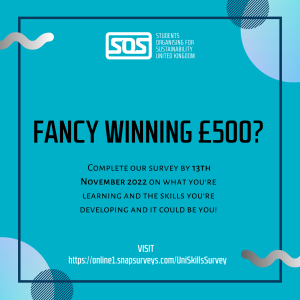 All students at King’s College London can be in with a chance of winning £500 by completing an online confidential survey about your time at university or college and the skills you develop for getting a job.
All students at King’s College London can be in with a chance of winning £500 by completing an online confidential survey about your time at university or college and the skills you develop for getting a job. 
